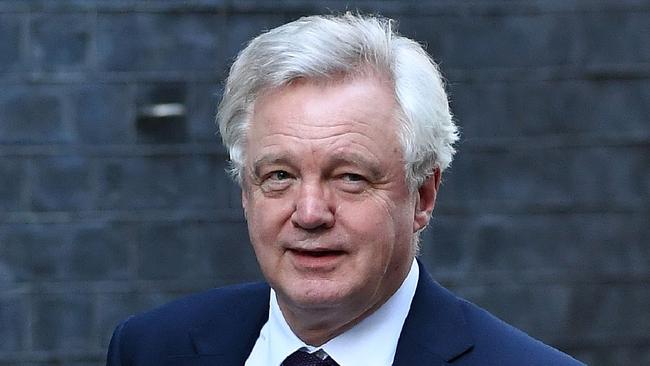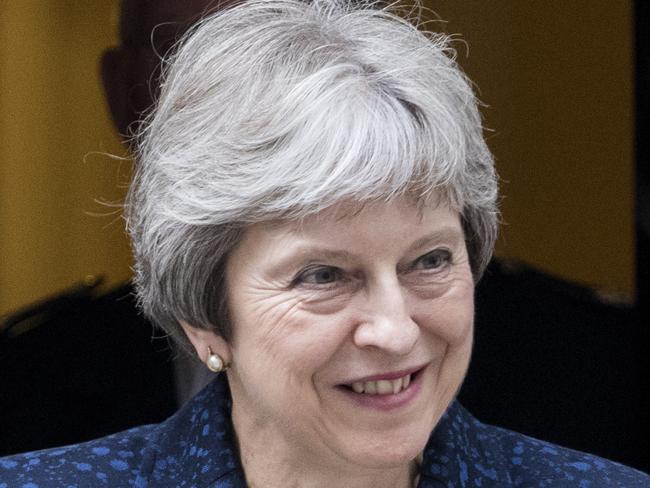Brexit: Mayday arrives for embattled Britain
Brexit has taken a messy turn that leaves the UK mired in political disarray and at the EU’s mercy.

The resignations of foreign secretary Boris Johnson and Brexit secretary David Davis has exploded the simmering hostility and conflict within the British government over the split from the EU.
It is not only their resignations — and that of junior minister Steve Baker — that prompts the crisis but the withering contempt of the government’s whole approach to Brexit outlined in his resignation letter.
Davis says Theresa May is selling out to the EU and in effect, if not in name, will reverse the meaning of the British popular vote to leave the EU.
This charge could prove deadly to the Prime Minister and opens up a wide range of unpredictable consequences for Britain. There are many, many possibilities, but the three main ones seem to be: a soft Brexit with May in charge; a cleaner and harder Brexit with a different Conservative in charge; or a Jeremy Corbyn prime ministership, in which case Brexit will be the least of the world’s troubles in interpreting the UK.
More than two years after the Brexit referendum decided Britain was leaving the EU, May took her cabinet to her country retreat, Chequers, on Friday to thrash out exactly what Britain’s position would be on the negotiations.
What was the shape of the Brexit that London wanted? What would the mechanics of a new relationship with the EU look like?
GRAPHIC: David Davis’s resignation
It’s astonishing that this had not been determined earlier. The mess is a bit of everyone’s fault and a bit just the way things are. But a series of key miscalculations by successive British leaders has produced this particularly messy moment.
The last prime minister, David Cameron, faced a huge political headache with the rise of the UK Independence Party. UKIP had one agenda item: get Britain out of the EU. It hoovered votes from Labour and the Conservatives, But the Tories, probably wrongly, thought it hurt them more.
Certainly it increased the agitation of Eurosceptics within Tory ranks. This Euroscepticism had three main sources: resentment at EU control over British life through the European Court of Justice; opposition to the inability of a British government to control immigration; and outrage at Britain sending billions of pounds to subsidise the EU budget, when the bloc was a byword for inefficiency, foolishness and overweening interference.
Cameron’s two key responses failed. The first was to negotiate with Brussels for Britain to take back some national powers. Brussels humiliated Cameron by giving him nothing. His second response was to promise an in/out referendum on British membership of the EU. He campaigned to stay in the EU and was defeated in the biggest single act of democratic self-determination in British history. Cameron made a third big mistake: he instructed the civil service to do no work at all in preparing for the results of a possible Leave vote. This was almost culpable. A referendum, two outcomes, both quite possible, but to underline the unthinkability of the Leave vote the government refuses to get the civil service to work through how it might be done.
As a result of all his mistakes, Cameron resigned. May replaced him. Though she has been a quiet Remainer, she quickly established her authority and took a fairly tough line on Brexit.
The UK, she said, wanted to remain friends with the EU and wished it well, but “Brexit means Brexit” and more particularly “no deal is better than a bad deal”. If the EU rejected a deal Britain would reform its social and fiscal system to out-compete the EU on taxes and efficiency. Britain would be leaving the single market and the customs union. The EU wouldn’t get any more British money, London would control its own immigration policies, British courts would no longer be overruled by Brussels. She sent the letter triggering the negotiation period, which means Britain leaves the EU, come what will, on March 29 next year.

The initial public reaction to May as PM was euphoric. Support for her and her vision of a clean, some might say hard, Brexit soared. Her position was so strong that she called an early election.
Big mistake. Having been 23 points ahead at the start of the campaign, May campaigned so badly that she barely survived the election and is now leading a minority government dependent on the support of Ulster’s Democratic Unionist Party. This equivocal election outcome destroyed May’s authority and was a huge fillip to the unreconciled Remainers in parliament, in the media and throughout the British establishment. They decided to water down Brexit to the point of meaninglessness, or to reverse it altogether.
May has struggled in the last year to hold the Brexiteers and the Remainers within her party together. Normally the Tory Right is far more potent than the Tory Left. It has all the support in the rank and file of the Conservative Party and it has shown a ruthlessness of purpose in the past, a willingness if necessary to destroy a Conservative government over issues of principle surrounding national sovereignty and Europe.
As the year has gone on, May’s position towards the EU seems to have consistently weakened. She agreed to a huge divorce payment of some £38 billion ($68bn). She agreed there would be no border between the Republic of Ireland, which remains part of the EU, and Northern Ireland, which remains part of the UK.
Now, in her Chequers position, she has produced a strange and at critical points vague deal that seems to surrender most points to the EU. Though, and here is another rub, on past form Brussels is still likely to reject even this tepid British offering.
Under May’s new position there will be a “common rule book” for all goods, which means Britain still observes EU rules. And these rules, enforceable in Britain, will be interpreted by the European Court of Justice.
In a weirdly complex arrangement, Britain will charge British tariff rates on imported goods but for anything destined to go to the EU, it will charge EU tariff rates.
All of this is going to be fiendishly complex and will make it almost impossible for Britain to embark on new free trade agreements with other nations.
And although she says the free movement of people will end when Britain leaves the EU, there will be a special “mobility framework” with the bloc, which May’s critics believe could be free movement under another name.
May appointed key Brexiteers Davis, Johnson and Michael Gove to her cabinet partly so the huge Brexit faction of her party would sign up to, or at least consent to, the Brexit deal she negotiates.
This now looks very dubious as Jacob Rees-Mogg, the leader of the European Research Group, which has more than 60 Conservative MPs as members, has said if Davis can’t support it, the deal cannot be worth supporting.
May went down this road of least resistance partly because business has demanded no change. It wants the least disruption to trade with Europe possible. Part of the paradox of the situation is that Britain can only break through to a new and economically free situation if it endures some modest pain. Brexiteers have been reluctant to acknowledge the potential for this pain.
The pain would be minimised if a clean break were properly prepared for.
May’s position has been so weak because, in an echo of Cameron’s mistakes, she has not seriously tasked the civil service to prepare for the possibility of a no-deal Brexit, in which Britain just crashes out of the EU without an agreement and has to rely on World Trade Organisation rules.
The fatal weakness in May’s position is that since the election she has never looked as though she could walk away from Brussels if the latter insisted on a bad deal.
Here again there is a binary choice.
Either Britain gets a deal or it doesn’t. Failing to properly prepare for either outcome is extremely bad policy.
Davis’s resignation letter is absolutely devastating because it claims the Chequers deal effectively repudiates the result of the referendum.
Almost worse than that, he says May’s negotiating tactics have been completely wrong right from the start and he has only stayed on board to try to make it less bad than it might be. He says the sequencing of the negotiations, and giving in to the EU on the terms of the debate about Northern Ireland, were fundamental mistakes.
He says the Chequers position will “leave us in at best a weak negotiating position and possibly an inescapable one”.
He says control by the British parliament under the Chequers terms will be fictional.
And, perhaps most devastating of all, he doesn’t think Brussels will accept even this position, but will simply demand ever more concessions.
Given Davis’s position, it’s hard to see how the Tory Brexiteers on the backbench could possibly support such a deal.
Labour could conceivably rescue an ultra-soft Brexit by finally voting May’s soft version through, if May gets to stay as Prime Minister until next March. But then again, why would Labour want to rescue a Conservative government that could easily explode, be forced to an election and hand power to Corbyn?
This is highly volatile. Absolutely nothing is assured. But everyone has plenty to play for. Brexit could effectively be won or lost, like the World Cup, on a penalty shootout.







To join the conversation, please log in. Don't have an account? Register
Join the conversation, you are commenting as Logout